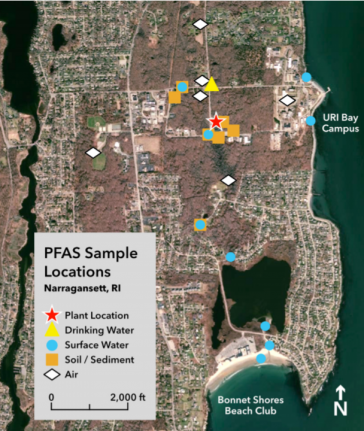
In spring of 2019, a community group in southern Rhode Island raised concerns about foul odors and potential contamination from the DeWAL-Rogers plastics plant in Narragansett, RI. The plant produces high-performance plastic polymer films, tapes and coatings, including Teflon tapes, all of which contain PFAS. South County Clean Air Action (SCCAA), a local nonprofit organization, contacted STEEP scientists at the University of Rhode Island to collect samples around the facility and determine if PFAS chemicals had been released into the surrounding neighborhood. A total of 27 environmental samples (soil, air, water) were collected by STEEP scientists for PFAS analysis and all samples were screened for approximately 30 different PFAS chemicals using liquid chromatography mass spectrometry in Dr. Rainer Lohmann’s laboratory at the University of Rhode Island.
PFAS concentrations ranged widely across the study area. For both water and soil/sediment samples, the highest PFAS concentrations were found near the facility and concentrations generally decreased with distance away from the plastics plant. Air samplers did not detect any PFAS in the air near the plant or in the surrounding neighborhoods and drinking water levels were well below the EPA’s health limit advisory of 70 ppt combined for PFOS and PFOA and even below the nation’s strictest level (8 ppt in Michigan for PFOA alone).
While PFAS were detected in water and soil, the levels found in the surrounding neighborhood were comparable to other “background” concentrations observed in places without a known source of PFAS contamination. The two drinking water samples were significantly lower than the EPA’s Health Limit Advisory (HLA) and on target with other drinking water samples in Rhode Island. In addition, most residences in this community are on municipal water, so any localized PFAS contamination in the groundwater would not impact their drinking water.

